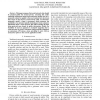Free Online Productivity Tools
i2Speak
i2Symbol
i2OCR
iTex2Img
iWeb2Print
iWeb2Shot
i2Type
iPdf2Split
iPdf2Merge
i2Bopomofo
i2Arabic
i2Style
i2Image
i2PDF
iLatex2Rtf
Sci2ools
123
click to vote
SOCIALCOM
2010
2010
q-Anon: Rethinking Anonymity for Social Networks
This paper proposes that social network data should be assumed public but treated private. Assuming this rather confusing requirement means that anonymity models such as kanonymity cannot be applied to the most common form of private data release on the internet, social network APIs. An alternative anonymity model, q-Anon, is presented, which measures the probability of an attacker logically deducing previously unknown information from a social network API while assuming the data being protected may already be public information. Finally, the feasibility of such an approach is evaluated suggesting that a social network site such as Facebook could practically implement an anonymous API using q-Anon, providing its users with an anonymous option to the current application model.
| Added | 15 Feb 2011 |
| Updated | 15 Feb 2011 |
| Type | Journal |
| Year | 2010 |
| Where | SOCIALCOM |
| Authors | Aaron Beach, Mike Gartrell, Richard Han |
Comments (0)

